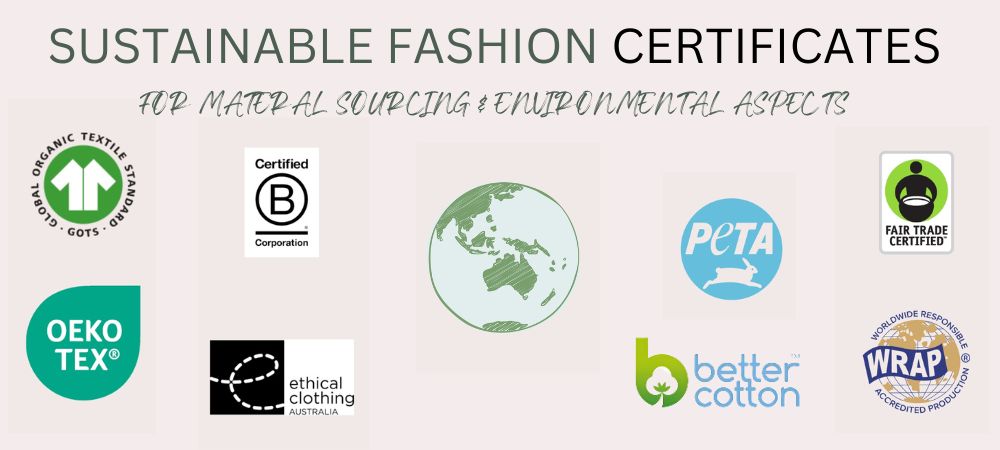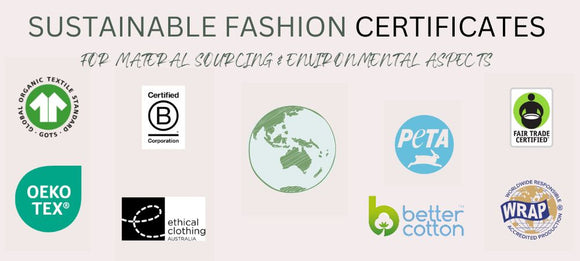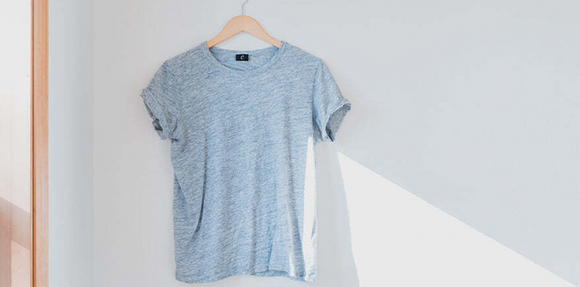
Making Sense of Ethical Fashion: Key Certifications Explained
Given the intricate web of the fashion industry's supply chains, sustainability is no simple feat. Certifications help cut through the noise, offering a trusted benchmark for responsible practices.
Certifications are more than just logos—they’re proof that a brand is truly committed to an ethical and sustainable journey. Each certification reflects care for the planet, respect for workers' rights, and dedication to quality, sustainable materials.
This blog is an evolving guide, created to shed light on the many certifications you might come across in the world of ethical and sustainable fashion. It's a work in progress, growing as I continue my journey of learning and discovery. Together, we can navigate the path to more conscious fashion choices and support the momentum of the sustainable fashion movement.
The one thing I do know, every time we choose a certified product, we're making a powerful statement. We are supporting a better future—one where transparency, fairness, and sustainability are the norms. Together, we can nudge the industry toward more ethical practices, one conscious choice at a time.
say NO to greenwashing
 GOTS - The Global Organic Textile Standard (GOTS) certifies textiles made with at least 70% organic materials, ensuring strict social and environmental standards across the supply chain. It regulates the use of chemicals like dyes to minimise environmental impact and toxicity. GOTS also monitors water and energy usage, requiring companies to track and reduce resource consumption. When you choose GOTS-certified products, you’re supporting ethical, sustainable, and transparent practices.
GOTS - The Global Organic Textile Standard (GOTS) certifies textiles made with at least 70% organic materials, ensuring strict social and environmental standards across the supply chain. It regulates the use of chemicals like dyes to minimise environmental impact and toxicity. GOTS also monitors water and energy usage, requiring companies to track and reduce resource consumption. When you choose GOTS-certified products, you’re supporting ethical, sustainable, and transparent practices.
 B-Corp certification measures a company's social and environmental impacts, ensuring it meets high standards of accountability and transparency. To achieve certification, businesses must score well on the B Impact Assessment, which evaluates their impact on employees, customers, communities, and the planet. This system encourages brands to improve their practices and highlights those committed to making a positive difference. The B-Corp logo signals dedication to ethical operations and responsible business practices, making it a trusted marker for conscious consumers.
B-Corp certification measures a company's social and environmental impacts, ensuring it meets high standards of accountability and transparency. To achieve certification, businesses must score well on the B Impact Assessment, which evaluates their impact on employees, customers, communities, and the planet. This system encourages brands to improve their practices and highlights those committed to making a positive difference. The B-Corp logo signals dedication to ethical operations and responsible business practices, making it a trusted marker for conscious consumers.
 Fair Trade focuses on economic empowerment and sustainable living by ensuring workers have safe conditions, fair pay, and opportunities to build better livelihoods. Certification means meeting strict standards that protect workers' rights, uplift communities, and safeguard the environment. Fair Trade factories also invest in eco-friendly practices, such as water-efficient technology, waste reduction, and minimising chemical use.
Fair Trade focuses on economic empowerment and sustainable living by ensuring workers have safe conditions, fair pay, and opportunities to build better livelihoods. Certification means meeting strict standards that protect workers' rights, uplift communities, and safeguard the environment. Fair Trade factories also invest in eco-friendly practices, such as water-efficient technology, waste reduction, and minimising chemical use.
Look for Fair Trade Certification to support brands that prioritise the well-being of garment workers and environmental responsibility in their supply chains.
Fair Trade means no slave labour, no child labour, safe and fair working conditions, and fair pay.
 WRAP (Worldwide Responsible Accredited Production) certifies ethical practices in the textile industry, ensuring safe, lawful, humane, and ethical manufacturing worldwide. It emphasises the well-being and dignity of workers, fostering a more humane and responsible industry. Seeing the WRAP certification means supporting brands committed to fair treatment, ethical production, and creating a better world for both workers and consumers.
WRAP (Worldwide Responsible Accredited Production) certifies ethical practices in the textile industry, ensuring safe, lawful, humane, and ethical manufacturing worldwide. It emphasises the well-being and dignity of workers, fostering a more humane and responsible industry. Seeing the WRAP certification means supporting brands committed to fair treatment, ethical production, and creating a better world for both workers and consumers.
 OEKO-TEX® ensures fabrics are free from harmful chemicals, promoting a cleaner, greener world. With 18 institutes across Europe and Japan, they bring expertise to keeping textiles safe and sustainable. Their STANDARD 100 badge guarantees products are safe for consumers and the planet. By choosing OEKO-TEX® certified items, you protect your health and the environment while supporting responsible practices in the textile industry.
OEKO-TEX® ensures fabrics are free from harmful chemicals, promoting a cleaner, greener world. With 18 institutes across Europe and Japan, they bring expertise to keeping textiles safe and sustainable. Their STANDARD 100 badge guarantees products are safe for consumers and the planet. By choosing OEKO-TEX® certified items, you protect your health and the environment while supporting responsible practices in the textile industry.
 Ethical Clothing Australia (ECA) ensures the rights of Australian textile, clothing, and footwear (TCF) workers are protected. Businesses earn ECA accreditation through audits that guarantee fair pay, legal entitlements, and safe working conditions. Supporting ECA-accredited brands strengthens the local TCF industry and advocates for fair treatment of garment workers, promoting ethical, homegrown fashion.
Ethical Clothing Australia (ECA) ensures the rights of Australian textile, clothing, and footwear (TCF) workers are protected. Businesses earn ECA accreditation through audits that guarantee fair pay, legal entitlements, and safe working conditions. Supporting ECA-accredited brands strengthens the local TCF industry and advocates for fair treatment of garment workers, promoting ethical, homegrown fashion.
 The Better Cotton Initiative (BCI) runs the world’s largest cotton sustainability program, aiming to improve conditions for farmers, the environment, and the industry. BCI sets standards encouraging environmental, social, and economic fairness. Clothes made with BCI cotton are more sustainably and ethically sourced, though not as eco-friendly as organic cotton.
The Better Cotton Initiative (BCI) runs the world’s largest cotton sustainability program, aiming to improve conditions for farmers, the environment, and the industry. BCI sets standards encouraging environmental, social, and economic fairness. Clothes made with BCI cotton are more sustainably and ethically sourced, though not as eco-friendly as organic cotton.
 Global Recycled Standard (GRS) & Recycled Claimed Standard (RCS), enforced by the Textile Exchange, are voluntary international standards certifying recycled materials and their chain of custody. GRS applies to products with at least 20% recycled content, requiring compliance with strict social, environmental, and chemical use criteria. Chain of Custody Certification ensures recycled material traceability from the recycler to the final product.
Global Recycled Standard (GRS) & Recycled Claimed Standard (RCS), enforced by the Textile Exchange, are voluntary international standards certifying recycled materials and their chain of custody. GRS applies to products with at least 20% recycled content, requiring compliance with strict social, environmental, and chemical use criteria. Chain of Custody Certification ensures recycled material traceability from the recycler to the final product.
 The Leather Working Group (LWG) certifies leather tanneries and traders committed to sustainability, awarding gold, silver, or bronze rankings. Their audits, conducted by third parties, assess environmental factors like waste management, water usage, and energy efficiency. LWG certification ensures leather is sourced through more sustainable and responsible practices.
The Leather Working Group (LWG) certifies leather tanneries and traders committed to sustainability, awarding gold, silver, or bronze rankings. Their audits, conducted by third parties, assess environmental factors like waste management, water usage, and energy efficiency. LWG certification ensures leather is sourced through more sustainable and responsible practices.
forest for all forever!
 The Forest Stewardship Council (FSC) ensures that products like cellulose-based fabrics (e.g., rayon and viscose) come from responsibly managed forests. Originally focused on paper, FSC now supports sustainable practices across supply chains to meet its 10 principles. While FSC certification promotes ethical forestry, water usage and other material practices may vary in sustainability.
The Forest Stewardship Council (FSC) ensures that products like cellulose-based fabrics (e.g., rayon and viscose) come from responsibly managed forests. Originally focused on paper, FSC now supports sustainable practices across supply chains to meet its 10 principles. While FSC certification promotes ethical forestry, water usage and other material practices may vary in sustainability.
 The PETA Approved Vegan certification ensures that apparel, accessories, furniture, or home decor products are free from animal-derived materials. However, it relies on self-auditing by participants, with no external checks to verify their claims, so transparency may vary.
The PETA Approved Vegan certification ensures that apparel, accessories, furniture, or home decor products are free from animal-derived materials. However, it relies on self-auditing by participants, with no external checks to verify their claims, so transparency may vary.


